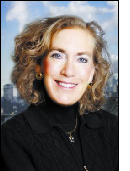Stem Cells and the Promise of Regenerative Medicine
featuring Elaine Fuchs, Ph.D.
| Date: |
Thursday, May 15, 2014 |
Place: |
1230 York Avenue at 66th Street |
| Time: |
12:00 noon – 2:00 p.m |
|
Abby Aldrich Rockefeller Hall |
| |
|
|
The Rockefeller University |
 Most of our cells are specialized to serve as muscle, nerve, blood, skin, or one of the body’s many other differentiated tissues. When these cells die in the course of disease, injury, or normal aging, the body issues “911 calls” that are answered by stem cells—versatile companions that reside within each tissue, with the potential to replenish specialized cells when they are lost.
Most of our cells are specialized to serve as muscle, nerve, blood, skin, or one of the body’s many other differentiated tissues. When these cells die in the course of disease, injury, or normal aging, the body issues “911 calls” that are answered by stem cells—versatile companions that reside within each tissue, with the potential to replenish specialized cells when they are lost.
How do stem cells retain their remarkable regenerative capacity? Why are some stem cells, such as those of the skin, so efficient at making new tissue? And why are other stem cells, such as those of the heart and brain, more limited in their potential? These are some of the many questions that fascinate Elaine Fuchs, Ph.D., who was recruited, with support from W&S donors, to become the University’s Rebecca C. Lancefield Professor in 2002.
Dr. Fuchs’s influential research on the biology of skin is clarifying the roles that stem cells play in building and regenerating tissues. Her laboratory has uncovered molecular signals that tell skin stem cells when to make hair, when to make epidermis instead, and when to stop once an injury is repaired. By focusing on fundamental mechanisms, her work is shedding light on the mysteries of the body’s “fountain of youth” cells. Although skin stem cells typically replace only the skin’s lost or dying cells, they are closely related to the many other types of stem cells that replenish virtually every tissue in the body. Studies by Dr. Fuchs and her collaborators have begun to reveal unforeseen opportunities for therapies involving stem cells.
Dr. Fuchs is also exploring the theory that tumors result from stem cells gone awry, raising the possibility that scientists could intervene in this process for cancer therapy. Her investigations are elucidating broad questions about how stem cells age, and whether changes in stem cells raise the risk of cancer as we grow older.
Elaine Fuchs was awarded the National Medal of Science by President Obama in 2009. She is the recipient of many honors, including the Albany Medical Center Prize, the March of Dimes Prize in Developmental Biology and, most recently, the Pezcoller Award from the American Association for Cancer Research. A member of the National Academy of Sciences and its Institute of Medicine, as well as a Howard Hughes Medical Institute investigator, Dr. Fuchs has served as president of the International Society for Stem Cell Research.
For more information please contact Amanda Martinez at (212) 327-7728 or amartinez@rockefeller.edu.